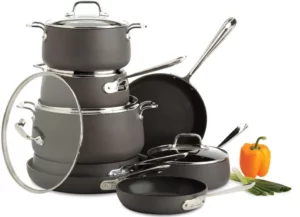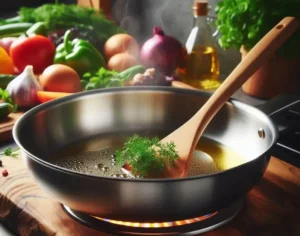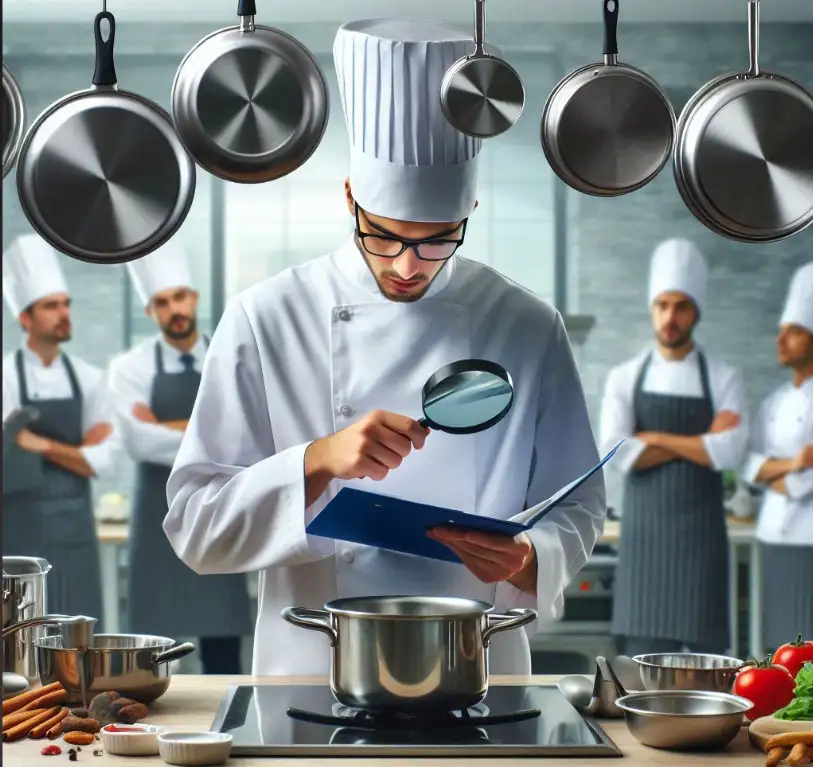Stainless steel cookware is celebrated for its durability and sleek, timeless appearance. But like any kitchen tool, stainless steel pans don’t last forever.
While some may see a few decades of use, others may need replacing sooner, especially if wear and tear are not managed properly.
In this guide, we’ll explore how long stainless steel pans can realistically last, signs that it might be time to replace them, and tips to extend their lifespan.
How Long Do Stainless Steel Pans Last?
The lifespan of stainless steel cookware depends largely on quality, maintenance, and frequency of use.
High-quality pans made from thick, well-constructed stainless steel can last decades with proper care.
For instance, this All-Clad Stainless Steel Cookware Set link is crafted with durable materials designed for long-term use, ideal for households that value both longevity and performance.

Factors that affect the lifespan of stainless steel pans include:
- Grade of Steel
Look for pans made from high-grade stainless steel with chromium and nickel. These metals enhance the pan’s resistance to corrosion and rust, essential for durability. - Pan Thickness
Thicker pans not only retain heat better but also resist warping, which can extend their life. Thin pans are more likely to bend and dent, shortening their usable life. - Pan Construction
Fully clad stainless steel pans with aluminum or copper cores distribute heat more evenly and tend to last longer than those that are only impact-bonded. This construction resists warping, ensuring even cooking over time.
When to Replace Stainless Steel Cookware
Even the best stainless steel pans may show signs that it’s time for a replacement. Here are a few common indicators:
- Warping
If your pan’s base begins to warp, it won’t sit evenly on the stovetop, causing uneven heating and making cooking difficult. This is especially common in thinner, low-quality pans. - Loose Handles
Loose handles are a safety hazard. Some handles can be tightened, but if the rivets are worn or molded handles come off, it’s safer to replace the pan entirely. - Deep Scratches and Pitting
Scratches may not seem serious, but deep ones can expose the core layer, allowing metals to leach into your food. To avoid this risk, switch to a new pan when scratches are significant. - Rust or Discoloration
While some discoloration is normal with time, rust should be taken seriously. Rusty cookware can compromise food safety, so replacing a rusted pan is essential.
If you’re noticing any of these issues, it may be time to replace your cookware.
For a high-quality upgrade, consider a set like this All-Clad Stainless Steel Cookware Set link, known for its durability and even cooking performance.
How to Extend the Life of Your Stainless Steel Cookware
While no cookware is immune to wear, some care practices can help you maximize the life of your stainless steel pans:

- Use Proper Cleaning Products
Avoid harsh abrasives and use cleaners like Bar Keepers Friend to remove stains without scratching. This type of cleaner effectively maintains the pan’s shine and durability. - Avoid High Heat
Overheating can cause warping and discoloration. Use medium or low heat, especially on gas stoves where heat distribution may be more direct. - Store Carefully
Avoid stacking heavy pans directly on top of each other, as this can cause dents and scratches. Using pan protectors, or even a dish towel between pans, is a simple way to prevent damage. - Invest in Quality Utensils
Metal utensils can scratch the surface of your pan, particularly if they’re heavy-handed. Instead, use silicone or wooden tools, which are gentler on the pan’s surface.
Considering Alternatives: Is Ceramic a Good Choice?
For those concerned with the longevity and health benefits of their cookware, ceramic can be a worthwhile alternative.
Unlike stainless steel, pure ceramic cookware is made without metal cores, reducing the risk of leaching.
Brands like Xtrema Cookware produce high-quality ceramic pans that are safe, scratch-resistant, and non-toxic.
Stainless steel cookware is a fantastic investment, offering decades of service when cared for properly.
However, even the most durable cookware will eventually show signs of wear. Knowing when to replace it and how to extend its life will ensure a safe, enjoyable cooking experience for years to come.
Looking to upgrade or replace your stainless steel cookware? This All-Clad Stainless Steel Cookware Set combines quality and longevity, making it a valuable addition to any kitchen focused on both performance and durability.

